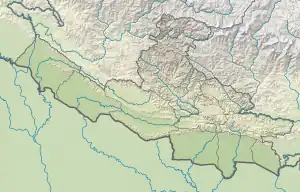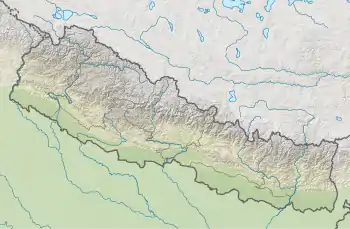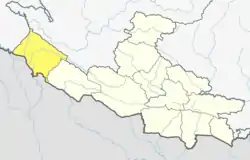Badhaiyatal Rural Municipality
Badhaiyatal (Nepali: बढैयाताल) is a rural municipality located in Bardiya District of Lumbini Province of Nepal.
Badhaiyatal
बढैयाताल गाउँपालिका | |
|---|---|
 Badhaiyatal Location of rural council  Badhaiyatal Badhaiyatal (Nepal) | |
| Coordinates: 28.19°N 81.48°E | |
| Country | |
| Province | Lumbini Province |
| District | Bardiya |
| Wards | 9 |
| Established | 10 March 2017 |
| Government | |
| • Type | Rural Council |
| • Chairperson | Mr. Himalaya Tripathi (9858024703) |
| • Vice-chairperson | Mrs. Laxmi Kumari Adhikari (9864866180) |
| Area | |
| • Total | 115.19 km2 (44.48 sq mi) |
| Population (2011) | |
| • Total | 47,868 |
| • Rank | 7th (Nepal) |
| • Density | 420/km2 (1,100/sq mi) |
| Time zone | UTC+5:45 (Nepal Standard Time) |
| Headquarter | Mainapokhar |
| Website | badhaiyatalmun |
The rural municipality came into existence on 10 March 2017 when the government of Nepal decided to dissolve the old administrative structure and reconstruct a new administrative division.[1][2]
Jamuni, Sorhawa, Manpur Mainapokhar and Kalika VDCs were merged to form this new rural municipality. The rural municipality divided into 9 wards and Mainapokhar declared headquarter of the rural municipality. Total population of the municipality is 47868 individuals according to the 2011 Nepal census. Total area of the council is calculated 115.19 square kilometres (44.48 sq mi).[3][4]
Demographics
At the time of the 2011 Nepal census, Badhaiyatal Rural Municipality had a population of 47,948. Of these, 49.9% spoke Nepali, 36.7% Tharu, 7.4% Awadhi, 2.4% Urdu, 1.3% Magar, 0.5% Gurung, 0.5% Newar, 0.5% Hindi, 0.4% Maithili, 0.3% Tamang and 0.1% other languages as their first language.[5]
In terms of ethnicity/caste, 37.4% were Tharu, 12.3% Hill Brahmin, 12.2% Chhetri, 11.4% Kami, 5.4% Magar, 2.8% Musalman, 2.7% Damai/Dholi, 2.6% Thakuri, 2.0% Yadav, 1.6% Chamar/Harijan/Ram, 1.3% Sarki, 1.1% Gurung, 1.1% Newar, 0.8% other Dalit, 0.7% Sanyasi/Dasnami, 0.6% Dusadh/Paswan/Pasi, 0.6% Kurmi, 0.5% Tamang, 0.3% Dhobi, 0.2% Terai Brahmin, 0.2% Gaine, 0.2% Gharti/Bhujel, 0.2% Hajjam/Thakur, 0.2% Kathabaniyan, 0.2% Kayastha, 0.2% Rajbanshi, 0.2% other Terai, 0.1% Badi, 0.1% Darai, 0.1% Halwai, 0.1% Kalwar, 0.1% Kanu, 0.1% Kumal, 0.1% Lohar, 0.1% Majhi, 0.1% Rai, 0.1% Teli and 0.1% others.[6]
In terms of religion, 92.7% were Hindu, 2.8% Muslim, 2.6% Christian, 1.7% Buddhist and 0.2% others.[7]
In terms of literacy, 66.3% could read and write, 2.3% could only read and 31.4% could neither read nor write.[8]
See also
References
- "New local level structure comes into effect from today". www.thehimalayantimes.com. The Himalayan Times. 10 March 2017. Retrieved 17 July 2018.
- "New local level units come into existence". www.kathmandupost.ekantipur.com. 11 March 2017. Retrieved 18 July 2018.
- "District Corrected Last for RAJAPATRA" (PDF). www.mofald.gov.np. Retrieved 17 July 2018.
- "स्थानीय तहहरुको विवरण" [Details of the local level bodies]. www.mofald.gov.np/en (in Nepali). Ministry of Federal Affairs and Local Development. Retrieved 17 July 2018.
- NepalMap Language
- NepalMap Caste
- NepalMap Religion
- NepalMap Literacy
